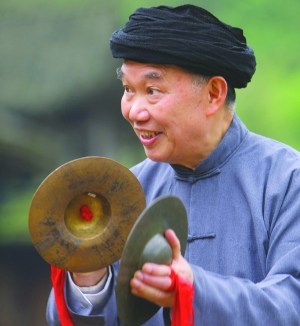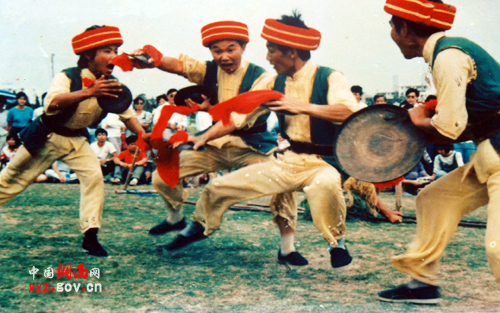
 |
|
Tian Longxin [Filephoto/ xxnet.com.cn] |
The Tujia, the seventh largest Chinese ethnic group, reside in Hunan, Hubei, Guizhou and Chongqing Municipality. The Tujia people have a long tradition of singing and dancing, which they perform at weddings and other rituals as well as in daily life. The most famous Tujia song, the Dragon Boat Song, has been recognized by UNESCO as one of “the world’s 25 best folk songs” in the 1980s.
Tian Longxin is regarded as a prodigy and guardian of Tujia music, not only for his artistic ability but also for his lifetime effort to preserve and continue the Tujia musical tradition. He has declared that his life is devoted to protecting China’s cultural heritage.
Mother as First Teacher
Tian was born in 1941 in Pojiao of Longshan County, Hunan Province, a village inhabited by the Tujia people. His father, an officer in the Kuomintang army, abandoned the family when he was two years old, leaving mother and child to fend for themselves. Tian’s mother did needlework for a living while Tian helped an uncle tend his cows.
Although poor, Tian’s mother insisted on sending Tian to a private school taught by a relative. His mother’s sacrifices inspired Tian to rigorous discipline in his studies, which was to become useful in later life. Immersed in Tujia culture, Tian became fascinated in local folk songs, an interest which his mother nurtured by teaching him to play a homemade reed instrument called the dongdongkui. Tian learned quickly and soon mastered the traditional Tujia instrument. At seven years old, Tian continued to study music from the village elders and learned other instruments from local wedding bands. As he grew older, Tian learned to play bronze bells from village shamans and attended Taoist ceremonies to learn how to play the gong and cymbals. At every wedding or funeral, Tian could be seen watching the musicians to learn their instruments. Thanks to his mother and other villagers, Tian became an expert in Tujia folk music.
Dedication
Tian was a disciplined student and never failed his mother. He did farm work while attending middle school to help ease his mother’s burden. After school, he worked at a local cooperative.
In his 14 years at the cooperative, Tian never lost interest in his beloved folk music. He collected resources on Tujia art between deliveries, and whenever he saw Tujia artists, asked them for advice and information. His free time was dedicated to art creation and performance, and his artistic works were often published in the county art magazine to great acclaim. His reputation eventually attracted the attention of local cultural authorities, and in 1974 he was given his first professional role in the county art troupe.

Tian Longxin [Filephoto/ xxz.gov.cn]
Collecting Tujia Folk Art
Tian had his dream job, but he was performing a dying art. Many Tujia artists died without passing on their skills to future generations. Dismayed at the art’s decline, Tian decided to pass on his teachers’ talents and thereafter started to collect and catalogue everything he could find about the local folk art.
Collecting information was never easy. As there was no transportation, Tian had to walk from village to village carrying an old backpack to visit local folk artists. Many lived in secluded villages, across high mountains and dense forests. He often spent a whole day travelling for an evening interview. Sometimes Tian had to make several trips to visit one artist. After collecting data, Tian also had to catalog and compile their stories as well as record musical notes, all by the light of a flickering kerosene lamp.
In this way he visited over 100 folk artists, collecting over 230 folk songs and writing more than 2.6 million characters about local operas and other performances. With these materials, Tian was able to cooperate with other professionals on editing three books: Folk Music Collection of Xiangxi Tujia and Miao Autonomous Prefecture, Chinese Folk Vocal Art – Collection in Longshan County and Chinese Folk Instrumental Music – Collection in Longshan County of Hunan Province.
Writing New Folk Songs
During his decades-long musical career, Tian’s preferred musical form was the Daliuzi, an instrumental ensemble of four percussion instruments, recognized in 2006 as part of China’s intangible cultural heritage. It took several tries before Tian figured out the best way to present the haunting tones of this ancient folk art. One day, he dreamed that he was a young cowboy listening to the crowing of golden pheasants. When he awoke, Tian felt a sudden surge of creative inspiration. The grace and elegance of the golden pheasant came to represent Tian’s vision of Tujia music, and he used the bird’s image as the theme of local folk music. He wrote a new Daliuzi melody, Romping Golden Pheasants, in which four instruments reflect different scenarios of the golden birds as they romp, strut and fight.
Romping Golden Pheasants was a critical success and highly acclaimed by audiences. It has also been selected as a representative of Chinese folk percussion music and toured the world. In 1985, Romping Golden Pheasants was selected by the Central Conservatory of Music as a masterpiece of Chinese percussion and performed in Germany, Italy, Switzerland and the Netherlands. In 1986, the Conservatory’s folk music troupe performed it in the United States. In 1993, the song was performed by the Chinese Percussion Music Troupe at a world percussion festival in Berlin. Audiences said that they had never imagined cymbals being played in so many ways.
Today, Romping Golden Pheasants has been recognized as “Influential Chinese Folk Music at Home and Abroad” by the Central Conservatory of Music and is regarded as a classic of Tujia and Chinese music. In 2012, the Conservatory launched a Tujia Daliuzi class and invited Tian as a lecturer.
Over the past decade, Tian has performed over 100 times at important art events at home and abroad. He has also organized a Tujia folk band with three other Daliuzi players. Now 73, Tian says that Tujia folk music is his lifelong career!

Presented by Chinadaily.com.cn Registration Number: 10023870-7
Copyright © Ministry of Culture, P.R.China. All rights reserved